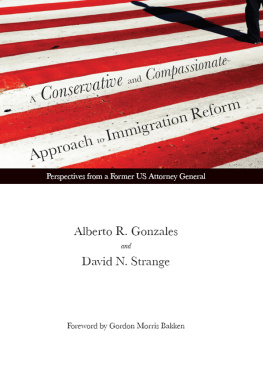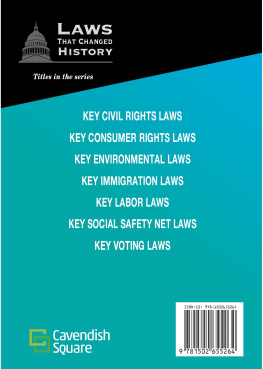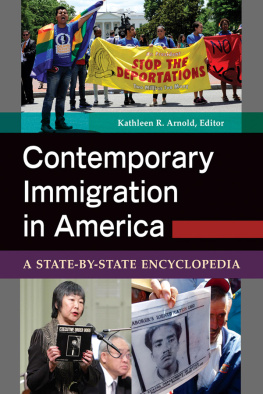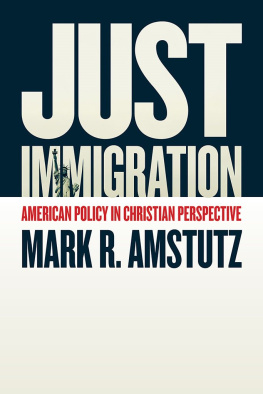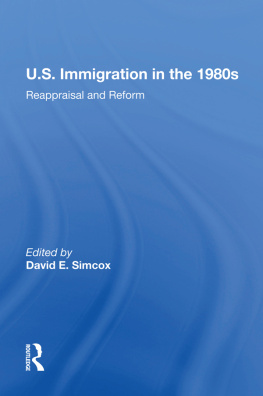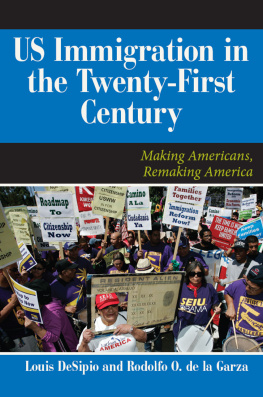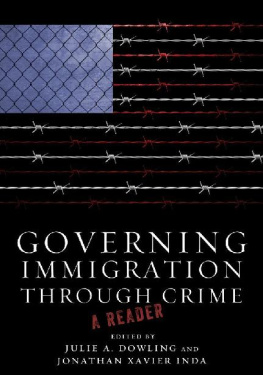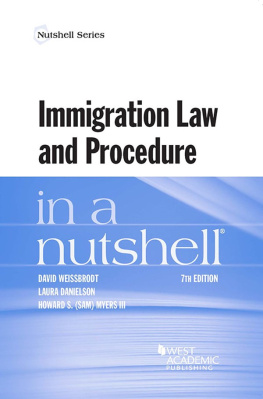Gordon Morris Bakken
Series Editor
Editorial Board
Michal Belknap
Richard Griswold del Castillo
Rebecca Mead
Matthew Whitaker
Also in the series
Broke, Not Broken: Homer Maxey's Texas Bank War
Broadus Spivey and Jesse Sublett
A Clamor for Equality: Emergence and Exile of an Early Californio Activist
Paul Bryan Gray
Hers, His, and Theirs: Community Property Law in Spain and Early Texas
Jean A. Stuntz
Lone Star Law: A Legal History of Texas
Michael Ariens
Quite Contrary: The Litigious Life of Mary Bennett Love
David J. Langum, Sr.
The Reckoning: Law Comes to Texas's Edwards Plateau
Peter R. Rose
Sex, Murder, and the Unwritten Law: Courting Judicial Mayhem, Texas Style
Bill Neal
Treasure State Justice: Judge George M. Bourquin, Defender of the Rule of Law
Arnon Gutfeld
A Conservative and Compassionate
Approach to Immigration Reform
PERSPECTIVES FROM A FORMER U.S. ATTORNEY GENERAL
Alberto R. Gonzales and David N. Strange
Foreword by Gordon Morris Bakken
Texas Tech University Press
Copyright 2014 by Alberto R. Gonzales and David N. Strange
All rights reserved. No portion of this book may be reproduced in any form or by any means, including electronic storage and retrieval systems, except by explicit prior written permission of the publisher. Brief passages excerpted for review and critical purposes are excepted.
This book is typeset in Minion Pro. The paper used in this book meets the minimum requirements of ANSI/NISO Z39.48-1992 (R1997).

Designed by Kasey McBeath
Library of Congress Cataloging-in-Publication Data
Gonzales, Alberto R.
A conservative and compassionate approach to immigration reform : perspectives from a former US Attorney General / Alberto R. Gonzales and David N. Strange ; foreword by Gordon Morris Bakken.
pages cm (American liberty and justice)
Includes bibliographical references and index.
ISBN 978-0-89672-896-7 (hardback) ISBN 978-0-89672-897-4 (e-book)
1. Emigration and immigration lawUnited States. 2. Emigration and immigrationUnited States. 3. Law reformUnited States. I. Strange, David N., author. II. Title.
KF4819.G569 2014
342.7308'2dc23
2014024584
14 15 16 17 18 19 20 21 22 / 9 8 7 6 5 4 3 2 1
Texas Tech University Press
Box 41037 | Lubbock, Texas 79409-1037 USA
800.832.4042 |
FOREWORD
T here is something for everyone to hate in A Conservative and Compassionate Approach to Immigration Reform. This is a book that conservatives and liberals will find compelling in its arguments and the depth of careful, comprehensive research. Yet the issues are so divisive that advocates for change will be taking copious notes from the text and sources. The authors have crafted arguments so skillfully that politicians of every stripe must deal with the implications for revision of the statutes.
Yet the immigration reform issues are complex. Clearly, mass deportations would hurt certain service industries, such as the undocumented work of cooks and other restaurant workers, construction labor, maids and housekeepers, grounds maintenance, and agricultural workers. Some ask why so many of the undocumented risk deportation rather than simply securing lawful status through an employment visa. The answer is in the nature of their work and the visa process. The authors fill in the procedural impediments for the undocumented, particularly the kind of work they perform. The answers may surprise some readers.
Some may debate the costs of illegal immigrants in our schools and hospital emergency rooms. Others may question the costs of uninsured motorists and wonder about the rise of hit-and-run accidents. The authors explore both and provide deeply researched discussions. They then move to federalism issues and the Tenth Amendment to the Constitution. Why do some states issue driver's licenses to the undocumented and others do not? California moved a license bill sponsored by Senator Kevin de Leon of Los Angeles after he was told by Gov. Jerry Brown that he was willing to sign the bill to goad Congress into immigration reform. An exercise in federalism evoked strong opinions.
Akhil Reed Amar argues, We must once again read the Constitution not After reading this book, ponder the possibility of how such an amendment would expand the spirit of the Constitution. This book pushes the mind as well as the heart because the issues are so evocative of emotion.
Border security is another contested area. The authors suggest that border security is possible with limited fencing, the use of natural barriers, legal virtual fences, technology, and training for border patrol personnel. Enforcement of the law is a critical issue and employment compliance is a necessity, yet the obstacle to reform is money. Congress must pay for the tools of border security. The federal government spends more than it receives in revenue and border security requires spending. Liberals and conservatives both will clearly find something to hate in the proposals for reform. Readers must have their pens out and ready to take notes. The complex issues have comprehensive proposals in this book. Read the book with care.
Gordon Morris Bakken
California State University, Fullerton
PREFACE
I nitially, we think it is important to state that we do not believe that all aspects of our immigration system are broken. In fiscal year 2010 alone, there were over 159 million nonimmigrant lawful admissions into the United States (counting multiple admissions of persons).
From fiscal years 2000 to 2009, over ten million immigrants acquired lawful permanent resident (LPR) status in the United States, and an additional one million acquired LPR status in fiscal year 2010 alone.
Moreover, our government makes available to non-U.S. citizens many forms of immigration relief outside the channels referred to above. These include, but are not limited to, cancellation of removal, asylum, withholding of removal, relief pursuant to the United Nations Convention against Torture, stay of removal, temporary protected status, U-visa relief for survivors of domestic violence and other crimes, humanitarian parole, protection under the Violence Against Women Act, trafficking victims relief, and deferred action. Some of these forms of relief from removal, or deportation, lead to lawful permanent residency and eventual U.S. citizenship, while others do not.
In fiscal year 2011 the U.S. Immigration and Customs Enforcement (ICE) removed 396,906 individuals, which was the largest number in the agency's history to date.and appellate procedure that allows non-U.S. citizens to seek redress before the immigration administrative system and before the U.S. courts. There are also available a myriad number of waivers available to both intending immigrants and nonimmigrants that forgive past conduct, making admission to the United States possible. Our civil servants in the Immigration Courts, the Department of Homeland Security, and abroad are consummate professionals, and they deserve to be recognized for the outstanding work they perform.
The point is that the United States has a functioning immigration system designed to deal with a global economy where we compete with other countries for goods and services. But in a post-9/11 world our government must have a much better understanding of what people are in our country and why they are here.

